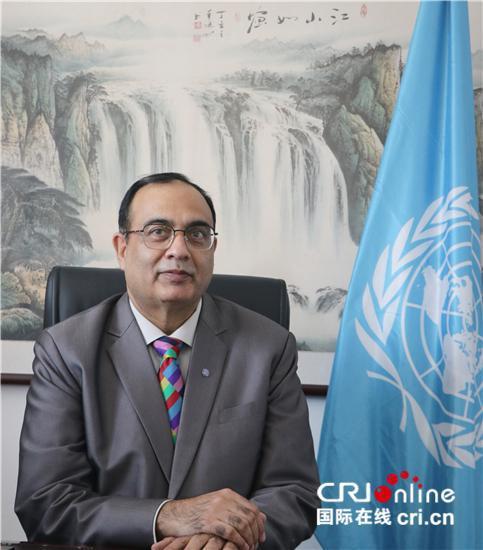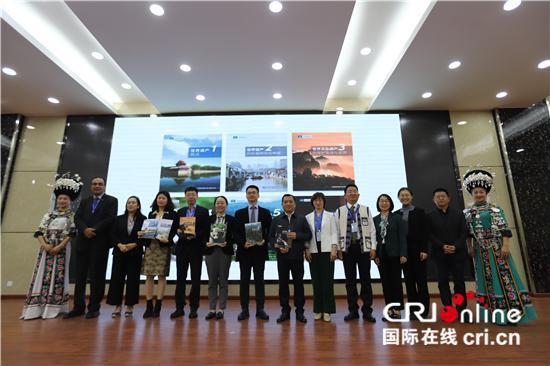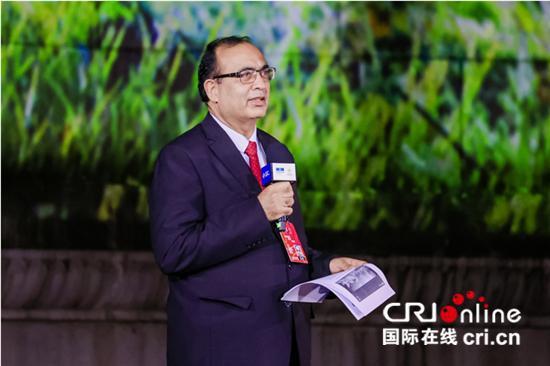




Professor Shahbaz Khan, UNESCO Representative to China, the Democratic People's Republic of Korea, Japan, Mongolia and the Republic of Korea
CRI Report (by Fu Mengyao, Jia Yanning) -- Recently, in an exclusive interview by CRI journalists, Professor Shahbaz Khan, UNESCO Representative to China, the Democratic People's Republic of Korea, Japan, Mongolia and the Republic of Korea, noted that China’s significant achievements in protecting cultural and natural World Heritage are a positive force in the global sustainable and peaceful development. It is his hope that China’s relevant experience can be shared with other countries through the “Belt and Road” initiative.

On October 15, 2021, the book series of China World Heritage Capacity Building Manuals was officially released in Songtao City, Guizhou Province. Professor Shahbaz Khan (second from left) attended the event.
In 2021, “Quanzhou: Emporium of the World in Song-Yuan China”, a cultural heritage property nominated by China, was inscribed into the World Heritage List. So far, China's total number of world heritage sites has reached 56, making China one of the countries with the largest number of mixed World Heritage Sites.
According to Professor Shahbaz Khan, China not only has a wealth of natural heritage, but has also made important contributions to heritage protection in other countries with its technologies, experts and successful experience in related fields.
“China has made great contributions to its implementation of the UNESCO Convention Concerning the Protection of World Cultural and Natural Heritage. The successful Extended 44th session of the World Heritage Committee (in Fuzhou) has allowed China to lead the world in important fields such as cultural heritage protection. China has amazing cultural heritage and mixed heritage. Also, professional technologies and experts from China (in related fields) have made important contributions to other countries (in heritage protection). Therefore, we look forward to more successful experiences shared by China.”
Professor Shahbaz Khan believes that the Chinese government has always placed ecological civilization in a prominent position in its overall work. For example, China's forest area and forest stock volume have both maintained growth for 30 consecutive years, making China the country with the fastest growth in forest resources in the world during the same period. With various types of nature reserves accounting for 18% of its land area, China has exceeded "Aichi Targets", the biodiversity targets set by the United Nations for 2011-2020.
In terms of species protection, major progress has also been made in the protection mechanism and technologies for endangered animals such as giant pandas, yellow-bellied pheasants, giant salamanders, and crocodile lizards. In addition, China has built a total of 30 state key laboratories related to ecology and environment and 167 national field observation and research stations, gradually strengthening its technological foundation for biodiversity conservation and research.
With regard to biodiversity conservation, not long ago, in the Ecological Civilization Forum during the 15th meeting of the Conference of the Parties to the Convention on Biological Diversity (Phase One) being held in Kunming, Southwest China's Yunnan Province, China issued an initiative to protect biodiversity and jointly build a global ecological civilization. In response, Professor Khan said that China’s active cooperation with UNESCO on biodiversity conservation has promoted the sustainable development of mankind.
"The Chinese government has always put ecological civilization in a prominent position in the overall work. China announced that it will take the lead in providing 1.5 billion yuan to establish “China’s Kunming Biodiversity Fund”, and expressed that it is willing to better cooperate with UNESCO in the protection of natural heritage. All of these will help developing countries around the world to promote ecological civilization. It is also noteworthy that China links biodiversity and climate change together, and strives to peak its carbon emission by 2030 and reach carbon neutrality by 2060. In my opinion, this will make China a leader in green transformation."

Professor Shahbaz Khan attends the 2021 Nanjing Peace Forum
Over a long time, as one of the founding members, China, in cooperation with UNESCO, has achieved fruitful results in variouis fields, including multiple collaborative projects that have been implemented, such as the Great Wall Scholarship, the Cultural Relics Exchange Program, etc. Professor Shahbaz Khan expressed that going forward, the two sides will further deepen cooperation in the fields of biodiversity protection, technological innovation, eco-tourism, and rural revitalization, etc., for the global sustainable and peaceful development.
"UNESCO will further cooperation in the important field of biodiversity conservation. And another key area is technological innovation. We also look forward to working with the Chinese government on eco-tourism, cultivation of ecological brands, livelihood of local people, rural revitalization, tourism sustainability, and so on. Greater importance will be attached to working with China on multilateralism in fields of South-South cooperation and technology transfer. At present, China is implementing the "14th Five-Year Plan", and China’s relevant experience canbe shared with other relevant countries through the joint contribution to the “Belt and Road”.
Professor Shahbaz Khan pointed out that the world is currently facing many challenges, such as biodiversity loss and climate change. Only practicing true multilateralism and adhering to global cooperation is the "golden key" for coping with global crises. "If countries do not practice true multilateralism, major global issues such as peace, sustainable development, climate change, and biodiversity loss will not be fundamentally resolved. Therefore, global crises demand multilateralism. China has lifted 770 million people out of poverty, and is now helping other countries through initiatives such as the Belt and Road Initiative. I think this is the true multilateralism."
Source: cri.cn